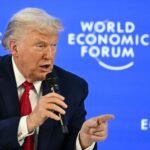A South Korea telecast last week purported to show satellite imagery of North Korean personnel at a Russian military facility. Photo: Kim Jae-Hwan/Zuma Press
North Korea has sent hundreds of special forces to eastern Russia for training in recent weeks, according to South Korea’s main intelligence agency, as Moscow relies on Pyongyang and other partners, including Iran, to support its war effort in Ukraine.
Russian naval vessels transported around 1,500 North Korean special-forces troops to Russia this month, and Pyongyang has plans eventually to send as many as 12,000 soldiers to assist Russia, according to South Korea’s National Intelligence Service.
The U.S. and its North Atlantic Treaty Organization allies have warned that dispatching North Korean troops to the front lines in Ukraine would represent a major escalation in the conflict between Moscow and the Washington-led West.
Russia has been using growing numbers of Iranian and North Korean missiles as it wages a fierce air war, but welcoming foreign troops onto its soil would represent a new dimension in how Moscow works with its international partners.
U.S. officials told The Wall Street Journal they think a number of North Korean troops are being trained and equipped in Russia, but the evidence isn’t definitive, and it is unclear exactly how many have been sent and what they are doing there.
NATO Secretary-General Mark Rutte said on Tuesday that South Korean experts would brief alliance officials early next week about North Korea’s involvement in the war.
South Korean officials meanwhile have expressed alarm at the prospect that North Korean troops could gain battlefield experience. The South Korean government Tuesday called the deployment a “significant security threat” and warned it would take phased measures in response, possibly including lethal aid to Ukraine.
South Korea, one of the world’s fastest-growing weapons manufacturers, so far has declined to send lethal weapons to Kyiv, providing only supplies such as gas masks and emergency kits. South Korea has sold weapons to countries, such as the U.S. and Poland, that are supplying Ukraine’s military.
The Ukraine war, as it grinds through its third year, has strained Russia’s manpower and weapons supplies. North Korea and Iran previously had helped address Moscow’s hunger for resources by supplying ammunition, drones and weapons.
South Korea’s intelligence agency last week released a satellite image it said showed North Korean personnel gathered at a Russian training center. Photo: handout/Agence France-Presse/Getty Images
For Moscow, the presence of North Korean troops adds a new element to the partnerships the Kremlin has cultivated since the start of the war with other countries, which have poured resources into Moscow’s war effort and undermined the West on the global stage.
The deepening involvement of North Korea and Iran in the war also serves Russian President Vladimir Putin’s strategic aims, allowing Moscow to export its tensions with the West to the Middle East and East Asia, where the U.S. traditionally has held more sway.
North Korea and Russia haven’t confirmed the presence of North Korean troops, but Kremlin spokesman Dmitry Peskov said on Monday that cooperation between the two countries wasn’t directed against third countries.
When Putin flew to North Korea in June to work out the details of an agreement on military cooperation, Pyongyang was ready to offer artillery shells in exchange for food and fuel, analysts said. But, according to a former Russian intelligence officer briefed on details of the pact, the pact eventually included a secret clause giving North Korea permission to send a first wave of about 1,000 North Korean soldiers to Ukraine to learn firsthand how to execute a war from Russia’s experience there. He said more would follow.
North Korean leader Kim Jong Un oversaw special-forces training last month. Photo: South Korea’s National Intelligence Service
For now, most of the North Korean troops are being kept at safe distances from the front line but are being shown how the Russians handle logistics and front-line tactics while gaining a new understanding of drone warfare, he said.
The North Korean troops that were sent recently arrived first in the eastern Russian city of Vladivostok, South Korea’s spy agency said. Once there, the North Koreans were issued Russian military uniforms, then sent to cities across Russia’s Far East for training, the agency said.
The North Korean troops could play a variety of roles, as missile technicians, front-line soldiers or even laborers supporting logistics, analysts said. On top of deeper pledges of support and transfer of military technology from Russia, the regime of Kim Jong Un will draw lessons from the army’s firsthand observation of modern military tactics and how North Korean weapons operate on the battlefield, analysts say.
North Korea is moving closer to the Russian sphere of influence by honoring the recent military treaty signed by Putin and Kim, and taking the chance to learn how to win a war of attrition and grind down an opposing side with artillery, said Benjamin R. Young, a nuclear security fellow at Rand Corp., a think tank based in Santa Monica, Calif.
“No drill or exercise can replicate real wartime experience and this could pay dividends in the event a future conflict plays out on the Korean Peninsula,” Young said.
North Korean rocket shells acquired by the Ukrainian military. Photo: South Korea’s National Intelligence Service
North Korea has a history of dispatching soldiers as technicians—who ended up flying jet fighters for the Egyptian air force, and possibly dozens of soldiers to Syria and Zimbabwe—but deploying thousands of troops for Russia poses risks to the Kim regime, said Fyodor Tertitskiy, a North Korea specialist at Kookmin University in Seoul.
North Korean soldiers, if deployed to the front lines, could surrender to Ukraine or escape, but what’s more dangerous for the Kim regime is potential ideological contamination, he said. Most of them have never been abroad and have spent their lives inside North Korea’s tightly controlled information bubble.
“It’s out of character and highly risky for North Korea,” Tertitskiy said. “It will be hard for Kim to motivate his people to fight in a faraway land without knowing why they’re fighting.”
Russia’s use of North Korean troops and weapons mirrors its growing military ties with Iran, which has supplied missiles and Shahed drones to the war effort. While relations between Russia and Iran have waxed and waned for years under Putin, the war has strengthened the ties. The cooperation helps in Putin’s efforts to export instability.
“Putin has an interest in seeing tensions rise on the Korean Peninsula, just as they did in the Middle East, because that means one more conflict for the West to have to deal with and even less attention, energy and money for Ukraine, which is their strategic goal,” said a senior European intelligence official.
Iranian President Masoud Pezeshkian traveled to Russia this week for a summit of Brics nations (the bloc comprises Brazil, Russia, India, China and South Africa). The leader is planning a separate trip to Moscow to sign what the two countries have referred to as an “All-encompassing Strategic Partnership Agreement.”
“The agreement is very important because it should form the basis for further development of relations between Russia and Iran,” said Yury Lyamin, a senior researcher at the Center for the Analysis of Strategies and Technologies, a Moscow-based defense think tank.
Russia already has developed a relationship with Iran’s allied militias in the Middle East, which have been escalating violence with Israel since last year’s Oct. 7 attack by Hamas. U.S. intelligence agencies have warned that Russia could send the Houthi militants in Yemen advanced antiship cruise missiles in retaliation for the Biden administration’s support for Ukrainian strikes inside Russia with U.S.-provided weapons. Such a move would sharpen the threat to U.S. warships in the Middle East, where the Houthis have been attacking shipping in solidarity with the Palestinians since Israel invaded Gaza.
While Western support for Ukraine has been driven by strategic defense interests and what NATO calls shared Western values, Moscow’s alliances with North Korea and Iran remain largely transactional, said Alexander Gabuev, Director of Carnegie Russia Eurasia Center in Berlin.
“They’re handsomely paid, they can test their hardware, they’re provided with combat experience,” he said, adding that it didn’t mean the relationships don’t have staying power.
“Even if it is transactional, there’s no deal the West could offer at this point that would tempt any of them to sell their partners down the river,” he said.
Lara Seligman, James Marson and Dan Michaels also contributed to this article.
By Dasl Yoon and Thomas Grove
dasl.yoon@wsj.com














